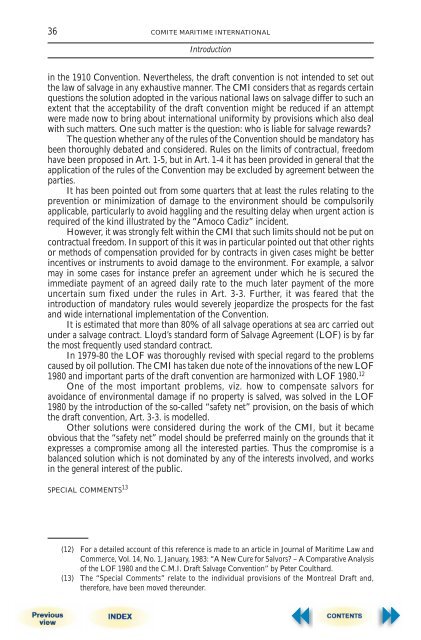Travaux Preparatoires of the Convention on Salvage 1989.pdf
Travaux Preparatoires of the Convention on Salvage 1989.pdf
Travaux Preparatoires of the Convention on Salvage 1989.pdf
Create successful ePaper yourself
Turn your PDF publications into a flip-book with our unique Google optimized e-Paper software.
36 COMITE MARITIME INTERNATIONALIntroducti<strong>on</strong>in <str<strong>on</strong>g>the</str<strong>on</strong>g> 1910 <str<strong>on</strong>g>C<strong>on</strong>venti<strong>on</strong></str<strong>on</strong>g>. Never<str<strong>on</strong>g>the</str<strong>on</strong>g>less, <str<strong>on</strong>g>the</str<strong>on</strong>g> draft c<strong>on</strong>venti<strong>on</strong> is not intended to set out<str<strong>on</strong>g>the</str<strong>on</strong>g> law <str<strong>on</strong>g>of</str<strong>on</strong>g> salvage in any exhaustive manner. The CMI c<strong>on</strong>siders that as regards certainquesti<strong>on</strong>s <str<strong>on</strong>g>the</str<strong>on</strong>g> soluti<strong>on</strong> adopted in <str<strong>on</strong>g>the</str<strong>on</strong>g> various nati<strong>on</strong>al laws <strong>on</strong> salvage differ to such anextent that <str<strong>on</strong>g>the</str<strong>on</strong>g> acceptability <str<strong>on</strong>g>of</str<strong>on</strong>g> <str<strong>on</strong>g>the</str<strong>on</strong>g> draft c<strong>on</strong>venti<strong>on</strong> might be reduced if an attemptwere made now to bring about internati<strong>on</strong>al uniformity by provisi<strong>on</strong>s which also dealwith such matters. One such matter is <str<strong>on</strong>g>the</str<strong>on</strong>g> questi<strong>on</strong>: who is liable for salvage rewards?The questi<strong>on</strong> whe<str<strong>on</strong>g>the</str<strong>on</strong>g>r any <str<strong>on</strong>g>of</str<strong>on</strong>g> <str<strong>on</strong>g>the</str<strong>on</strong>g> rules <str<strong>on</strong>g>of</str<strong>on</strong>g> <str<strong>on</strong>g>the</str<strong>on</strong>g> <str<strong>on</strong>g>C<strong>on</strong>venti<strong>on</strong></str<strong>on</strong>g> should be mandatory hasbeen thoroughly debated and c<strong>on</strong>sidered. Rules <strong>on</strong> <str<strong>on</strong>g>the</str<strong>on</strong>g> limits <str<strong>on</strong>g>of</str<strong>on</strong>g> c<strong>on</strong>tractual, freedomhave been proposed in Art. 1-5, but in Art. 1-4 it has been provided in general that <str<strong>on</strong>g>the</str<strong>on</strong>g>applicati<strong>on</strong> <str<strong>on</strong>g>of</str<strong>on</strong>g> <str<strong>on</strong>g>the</str<strong>on</strong>g> rules <str<strong>on</strong>g>of</str<strong>on</strong>g> <str<strong>on</strong>g>the</str<strong>on</strong>g> <str<strong>on</strong>g>C<strong>on</strong>venti<strong>on</strong></str<strong>on</strong>g> may be excluded by agreement between <str<strong>on</strong>g>the</str<strong>on</strong>g>parties.It has been pointed out from some quarters that at least <str<strong>on</strong>g>the</str<strong>on</strong>g> rules relating to <str<strong>on</strong>g>the</str<strong>on</strong>g>preventi<strong>on</strong> or minimizati<strong>on</strong> <str<strong>on</strong>g>of</str<strong>on</strong>g> damage to <str<strong>on</strong>g>the</str<strong>on</strong>g> envir<strong>on</strong>ment should be compulsorilyapplicable, particularly to avoid haggling and <str<strong>on</strong>g>the</str<strong>on</strong>g> resulting delay when urgent acti<strong>on</strong> isrequired <str<strong>on</strong>g>of</str<strong>on</strong>g> <str<strong>on</strong>g>the</str<strong>on</strong>g> kind illustrated by <str<strong>on</strong>g>the</str<strong>on</strong>g> “Amoco Cadiz” incident.However, it was str<strong>on</strong>gly felt within <str<strong>on</strong>g>the</str<strong>on</strong>g> CMI that such limits should not be put <strong>on</strong>c<strong>on</strong>tractual freedom. In support <str<strong>on</strong>g>of</str<strong>on</strong>g> this it was in particular pointed out that o<str<strong>on</strong>g>the</str<strong>on</strong>g>r rightsor methods <str<strong>on</strong>g>of</str<strong>on</strong>g> compensati<strong>on</strong> provided for by c<strong>on</strong>tracts in given cases might be betterincentives or instruments to avoid damage to <str<strong>on</strong>g>the</str<strong>on</strong>g> envir<strong>on</strong>ment. For example, a salvormay in some cases for instance prefer an agreement under which he is secured <str<strong>on</strong>g>the</str<strong>on</strong>g>immediate payment <str<strong>on</strong>g>of</str<strong>on</strong>g> an agreed daily rate to <str<strong>on</strong>g>the</str<strong>on</strong>g> much later payment <str<strong>on</strong>g>of</str<strong>on</strong>g> <str<strong>on</strong>g>the</str<strong>on</strong>g> moreuncertain sum fixed under <str<strong>on</strong>g>the</str<strong>on</strong>g> rules in Art. 3-3. Fur<str<strong>on</strong>g>the</str<strong>on</strong>g>r, it was feared that <str<strong>on</strong>g>the</str<strong>on</strong>g>introducti<strong>on</strong> <str<strong>on</strong>g>of</str<strong>on</strong>g> mandatory rules would severely jeopardize <str<strong>on</strong>g>the</str<strong>on</strong>g> prospects for <str<strong>on</strong>g>the</str<strong>on</strong>g> fastand wide internati<strong>on</strong>al implementati<strong>on</strong> <str<strong>on</strong>g>of</str<strong>on</strong>g> <str<strong>on</strong>g>the</str<strong>on</strong>g> <str<strong>on</strong>g>C<strong>on</strong>venti<strong>on</strong></str<strong>on</strong>g>.It is estimated that more than 80% <str<strong>on</strong>g>of</str<strong>on</strong>g> all salvage operati<strong>on</strong>s at sea arc carried outunder a salvage c<strong>on</strong>tract. Lloyd’s standard form <str<strong>on</strong>g>of</str<strong>on</strong>g> <strong>Salvage</strong> Agreement (LOF) is by far<str<strong>on</strong>g>the</str<strong>on</strong>g> most frequently used standard c<strong>on</strong>tract.In 1979-80 <str<strong>on</strong>g>the</str<strong>on</strong>g> LOF was thoroughly revised with special regard to <str<strong>on</strong>g>the</str<strong>on</strong>g> problemscaused by oil polluti<strong>on</strong>. The CMI has taken due note <str<strong>on</strong>g>of</str<strong>on</strong>g> <str<strong>on</strong>g>the</str<strong>on</strong>g> innovati<strong>on</strong>s <str<strong>on</strong>g>of</str<strong>on</strong>g> <str<strong>on</strong>g>the</str<strong>on</strong>g> new LOF1980 and important parts <str<strong>on</strong>g>of</str<strong>on</strong>g> <str<strong>on</strong>g>the</str<strong>on</strong>g> draft c<strong>on</strong>venti<strong>on</strong> are harm<strong>on</strong>ized with LOF 1980. 12One <str<strong>on</strong>g>of</str<strong>on</strong>g> <str<strong>on</strong>g>the</str<strong>on</strong>g> most important problems, viz. how to compensate salvors foravoidance <str<strong>on</strong>g>of</str<strong>on</strong>g> envir<strong>on</strong>mental damage if no property is salved, was solved in <str<strong>on</strong>g>the</str<strong>on</strong>g> LOF1980 by <str<strong>on</strong>g>the</str<strong>on</strong>g> introducti<strong>on</strong> <str<strong>on</strong>g>of</str<strong>on</strong>g> <str<strong>on</strong>g>the</str<strong>on</strong>g> so-called “safety net” provisi<strong>on</strong>, <strong>on</strong> <str<strong>on</strong>g>the</str<strong>on</strong>g> basis <str<strong>on</strong>g>of</str<strong>on</strong>g> which<str<strong>on</strong>g>the</str<strong>on</strong>g> draft c<strong>on</strong>venti<strong>on</strong>, Art. 3-3. is modelled.O<str<strong>on</strong>g>the</str<strong>on</strong>g>r soluti<strong>on</strong>s were c<strong>on</strong>sidered during <str<strong>on</strong>g>the</str<strong>on</strong>g> work <str<strong>on</strong>g>of</str<strong>on</strong>g> <str<strong>on</strong>g>the</str<strong>on</strong>g> CMI, but it becameobvious that <str<strong>on</strong>g>the</str<strong>on</strong>g> “safety net” model should be preferred mainly <strong>on</strong> <str<strong>on</strong>g>the</str<strong>on</strong>g> grounds that itexpresses a compromise am<strong>on</strong>g all <str<strong>on</strong>g>the</str<strong>on</strong>g> interested parties. Thus <str<strong>on</strong>g>the</str<strong>on</strong>g> compromise is abalanced soluti<strong>on</strong> which is not dominated by any <str<strong>on</strong>g>of</str<strong>on</strong>g> <str<strong>on</strong>g>the</str<strong>on</strong>g> interests involved, and worksin <str<strong>on</strong>g>the</str<strong>on</strong>g> general interest <str<strong>on</strong>g>of</str<strong>on</strong>g> <str<strong>on</strong>g>the</str<strong>on</strong>g> public.SPECIAL COMMENTS 13(12) For a detailed account <str<strong>on</strong>g>of</str<strong>on</strong>g> this reference is made to an article in Journal <str<strong>on</strong>g>of</str<strong>on</strong>g> Maritime Law andCommerce, Vol. 14, No. 1, January, 1983: “A New Cure for Salvors? – A Comparative Analysis<str<strong>on</strong>g>of</str<strong>on</strong>g> <str<strong>on</strong>g>the</str<strong>on</strong>g> LOF 1980 and <str<strong>on</strong>g>the</str<strong>on</strong>g> C.M.I. Draft <strong>Salvage</strong> <str<strong>on</strong>g>C<strong>on</strong>venti<strong>on</strong></str<strong>on</strong>g>” by Peter Coulthard.(13) The “Special Comments” relate to <str<strong>on</strong>g>the</str<strong>on</strong>g> individual provisi<strong>on</strong>s <str<strong>on</strong>g>of</str<strong>on</strong>g> <str<strong>on</strong>g>the</str<strong>on</strong>g> M<strong>on</strong>treal Draft and,<str<strong>on</strong>g>the</str<strong>on</strong>g>refore, have been moved <str<strong>on</strong>g>the</str<strong>on</strong>g>reunder.
















